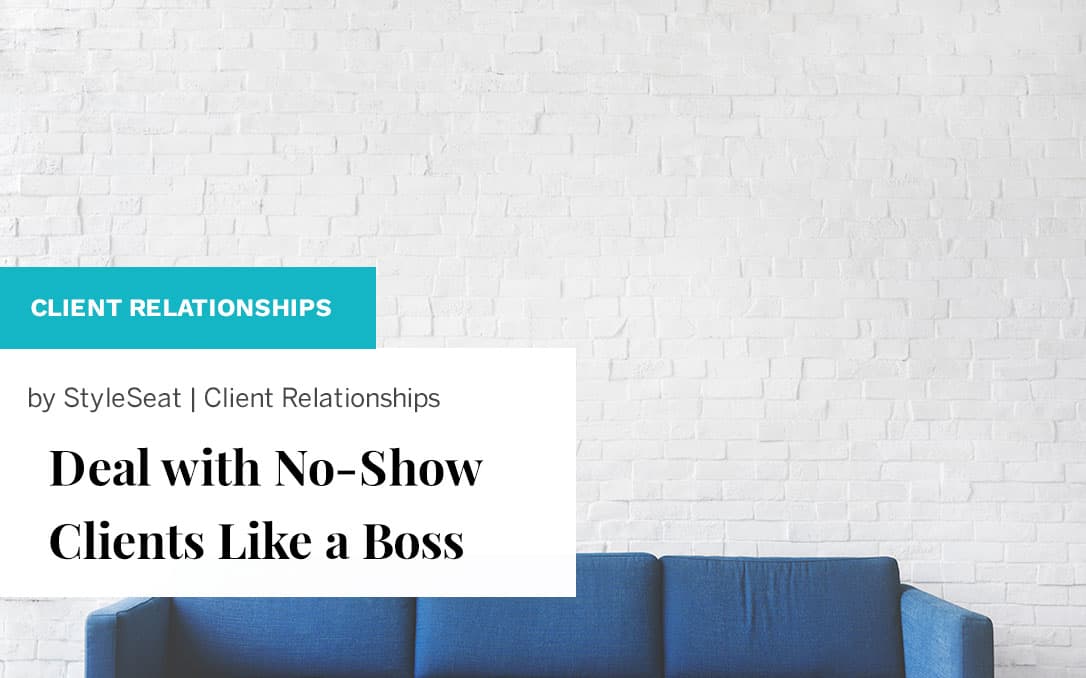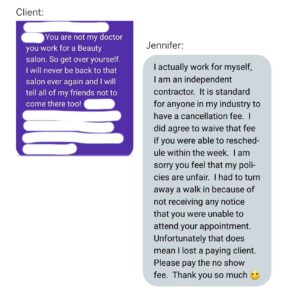Deal with No-Show Clients Like a Boss

Every independent beauty professional has to deal with no-show clients — that’s a fact. But, not every professional knows: you deserve to get paid for your time.
You are a marketer, bookkeeper, artist, and more — you are just as legitimate as other businesses and you deserve to be treated that way. When you’re a new business owner, it can be hard to find the confidence to stand up for yourself, that’s why we wanted to share some helpful tips from skin care specialist and business owner, Jennifer Hunt, about how to deal with no-show clients in a professional way that builds your reputation and makes room for clients who respect you.
WHY A NO-SHOW POLICY IS GOOD FOR BUSINESS
Jennifer says, even in the early stages of building a clientele, it’s important to enforce a no-show policy. “The tipping point for me was having a day where four clients didn’t show up. I called and left voicemails but never heard from those people again. After that, I decided I had to take it seriously.”
When we asked Jennifer if she’d ever lost clients because of her policy, she explained, “Only ones who don’t value me or my career, which is actually only a handful of people so far. The clients who do see the value in my work have no problem with the policy because they take me just as seriously as I take myself, and I guess that’s why I have a strict policy now. I know that I’m not everyone’s esthetician, nor is everyone my client. So do I want to attract clients who see me and my work as disposable and run-of-the-mill? No! I want clients who come to me because I help them achieve their skin care goals. Quality over quantity.”
WHAT DOES A GOOD NO-SHOW POLICY LOOK LIKE?
Jennifer says to keep things simple and enforce the same policy for all clients, new and returning. “Everyone must leave contact information, and I hold the appointment with a credit card. My regular clients have no problem with the policy, some have credit cards on file from online booking but some do not. New clients generally ask me why I need the credit card information and that gives me the opportunity to tell them that I only charge it if they don’t show up for their appointment. That’s when they realize it’s important to show up.”
If you’re worried about making your policy too strict, Jennifer says to remember that everyone’s human and you can always choose to waive the fee. “Because I’m building the last bit of my clientele I am always willing to work with people. If it’s the first time they’ve no-showed, I leave a note on their file and address it when they reschedule, I will let them know that the next time they no-show, they have to pay a fee.”
Read more about how to use client notes to improve business here.
HOW TO DEAL WITH NO-SHOWS WHEN THEY HAPPEN
When you run into the occasional rude client, it can be discouraging — remember not to take it personally. If a client can’t handle your policy and they decide to leave you, that’s better for business! Now that spot can be filled by a client who will help you grow rather than hold you back. If you’re not sure how to respond when clients question your policy, see how Jennifer handles this angry client like a boss: she stays professional, educates her client about how no-shows affect her business and doesn’t let it get personal:
“Recently, I had an existing client no-show for an appointment. I gave her ample opportunity to reschedule, agreeing to waive my fee if she could come in by the end of the week. I even had to turn down a walk-in while I waited for her. I never heard from her so I sent a fee request.

“What it all boils down to is what kind of clients you want. The ones who see you as valuable or the ones who don’t. The ones who respect you and your craft or ones who don’t. My regulars love the results they get from my services, and that tells me that the right clients are there. So don’t let other people devalue what you do or offer.”
You can check out Jennifer’s StyleSeat Page here.
Not signed up for StyleSeat yet? Learn more here.
For more business tips, check out these articles:
- Should You Charge for No-Shows?
- How to Deal with Chronically Late Clients
- How to Set Boundaries with Salon Clients



